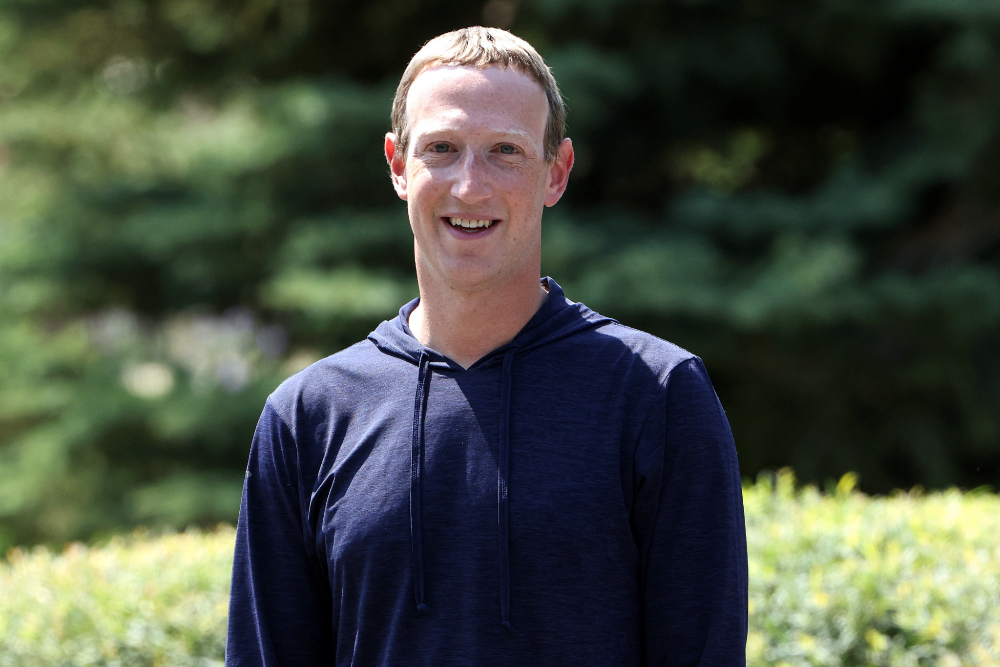In a striking ascent that reshapes the upper echelons of global wealth, Mark Zuckerberg, the chief executive of Meta, has overtaken Jeff Bezos to become the world’s second-richest individual. This shift in the financial landscape, as reported by Bloomberg’s Billionaires Index, places Zuckerberg’s net worth at a staggering $206.2 billion, surpassing Bezos’s $205.1 billion.
The dramatic rise in Zuckerberg’s fortune is inextricably linked to Meta’s robust stock performance. The company’s shares reached an unprecedented high of $582.77 on Thursday, marking a remarkable 68% increase since the year’s outset. This surge has propelled Zuckerberg’s personal wealth upward by $78 billion since January, outpacing all other individuals among the 500 wealthiest tracked by Bloomberg.
Meta’s financial resurgence has captivated investor attention, with the company consistently surpassing quarterly earnings projections throughout 2024. The tech giant reported a notable 22% increase in second-quarter sales, reaching $39.07 billion, cementing its fourth consecutive quarter of revenue growth exceeding 20%.
At the heart of Meta’s renaissance lies its strategic pivot toward artificial intelligence. The company credits its substantial investments in AI for enhancing its online advertising platform, a move that has proven crucial in overcoming previous challenges. This technological emphasis marks a deliberate response to the setbacks faced in 2021 when Apple’s iOS privacy changes significantly impacted Meta’s user tracking capabilities.
Zuckerberg’s leadership during this period of transformation has been marked by bold decision-making. In late 2022, he orchestrated a major cost-reduction initiative that resulted in the departure of approximately 21,000 employees, roughly a quarter of Meta’s workforce. This strategic realignment has been met with approval from investors, coinciding with a robust recovery in the company’s online advertising business.
The rebound in Meta’s core business has been further bolstered by increased digital ad spending from emerging e-commerce players, particularly Chinese retailers like Temu and Shein. This influx of advertising revenue has reinforced investor confidence in the company’s adaptive strategies.
Despite the renewed focus on its primary revenue streams, Meta continues to channel significant resources into the development of virtual and augmented reality technologies. These investments, crucial for the company’s vision of the metaverse, have garnered support from stakeholders, provided the main advertising business maintains its strong performance.
In a recent demonstration of its commitment to innovation, Meta unveiled its Orion augmented reality glasses. The device, which has received positive initial feedback, represents a tangible step toward Zuckerberg’s ambitious vision for the future of human-computer interaction.
Zuckerberg’s ascension to the position of second-richest person globally is not merely a personal milestone but a testament to Meta’s resilience and adaptability in a rapidly evolving tech landscape. It underscores the company’s successful navigation of recent challenges and its strategic positioning for future growth.
The implications of this shift in wealth extend beyond individual fortunes, reflecting broader trends in the technology sector and global economy. It highlights the increasing centrality of digital platforms and the potential for rapid wealth accumulation in the tech industry.
As Meta continues to chart its course through the complexities of the digital realm, the tech world watches with keen interest. Zuckerberg’s vision, which encompasses both immediate profitability and long-term technological advancement, stands poised to significantly influence the trajectory of social media, digital advertising and immersive technologies.
The coming months and years will likely see continued scrutiny of Meta’s strategies and their impact on the broader tech ecosystem. As the company balances its core business with investments in emerging technologies, its success or failure could have far-reaching consequences for the industry at large.
In the ever-shifting landscape of global wealth and technological innovation, Zuckerberg’s rise serves as a powerful reminder of the dynamic nature of success in the digital age. It underscores the potential for rapid change and the ongoing competition for dominance among tech giants.
As the story of Meta and its CEO continues to unfold, it will undoubtedly provide fertile ground for analysis and speculation about the future direction of technology and its role in shaping the global economy.




